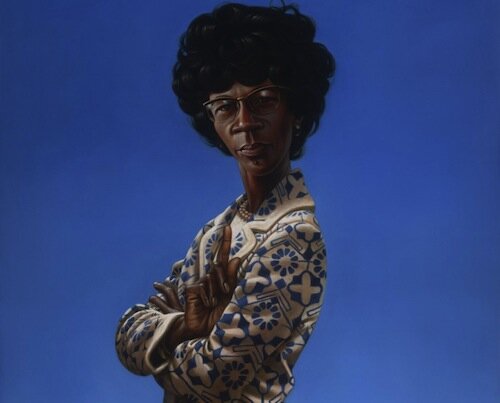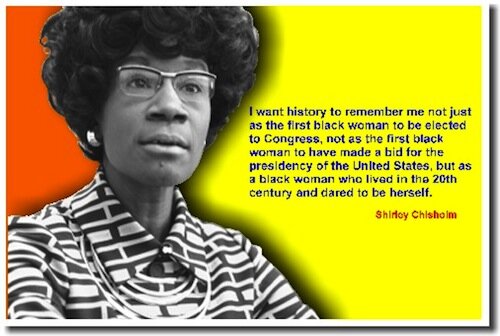Ask A Heroine: Welcome to the experts corner, love. This is where you ask your burning questions on business and life, and receive personal advice from the best. Each month we feature amazing industry Heroines and their wise video answers to your deepest inquiries. Here, questions give way to solutions, insights transform into action, and more »
Heroines of History: Shirley Chisholm – A Catalyst of Change
Heroines of History: These are American women, and their actions were not motivated by fortune or fame. There was no glory, and in many cases very little recognition for their activities. They simply did what needed to be done, and they did so in an extraordinary way. They roared without making a sound, and it is time they were given a voice. Shirley Chisholm, we hear you.
Shirley Anita St. Hill was born in Brooklyn, New York, on November 30, 1924, to immigrant parents. Her father, from Guyana, was a factory worker and her mother, from Barbados, was a seamstress and domestic servant. As money was tight and their living situation precarious, Shirley was sent to live on her grandmother’s farm in Barbados at the age of three.
Shirley began her schooling in Barbados where the education system was based on the strict English system that focused on an intensive study of reading, writing, and arithmetic from a child’s first day of school. More importantly for Shirley, this focus extended to not only the black children on the island, but also the girls.
When she finally returned to New York at the age of ten, she had acquired a solid foundation in schooling, as well as a slight English accent that she retained for the rest of her life.
While in Barbados, Shirley’s parents worked to buy a house for their family, which they were able to do in the Bedford-Stuyvesant neighborhood of Brooklyn, one of the poorest urban districts in the nation.
Because of her educational head start, Shirley excelled in the New York public schools, graduating with high marks. She received scholarship offers from several colleges, but as her family couldn’t afford to send her to an out-of- state college, she attended Brooklyn College where she could attend while still living at home. She graduated Cum Laude in 1946, with a BA in sociology.
However, as the job market remained flooded with veterans returning from WWII, jobs were scarce. Shirley had to take a job teaching at a nursery school. The silver lining was that this job provided her the opportunity to pursue an interest that had been sparked in college, political activism. She joined several political organizations, including the League of Women Voters, the NAACP, the 17 th Assembly District Democratic Club, and the Unity Democratic Club, which she helped form.
It was also during this time that she met and, in 1949, married Conrad Chisholm, who shared her interest in grassroots organizations.
Shirley also made the definitive decision to pursue a career in education by enrolling in the Master’s program for early childhood education at Columbia University. She graduated in 1952, and in 1953, she was hired on as the director of the Hamilton-Madison Child Care Center, where she gained the reputation as an expert in the field of childhood education. She worked as director until 1959, when she was hired as an educational consultant for New York City’s Division of Day Care.
Despite her successes in the field of education, Shirley still maintained her interest in politics. In 1964 she was elected to the New York State Legislature. She became the second black woman to serve in Albany, where she spent her time fighting for the people she grew up with in the Bedford-Stuyvesant neighborhood.
Among other things, Shirley lobbied for additional aid so that students of low-income families could more easily attend college. She lobbied for unemployment benefits for domestic workers and maternity leave protection for teachers. Shirley recognized that the majority of women in New York wound up as teachers, nannies, or maids, and as such Shirley fought to give them protections.

Shirley’s tenure in Albany was marked by her progressive ideals and unwillingness to stand idly by while senior members ran things. From day one, Shirley showed up to fight for the people she represented, and she didn’t care whose feathers she ruffled in the process.
Shirley took this same attitude on the campaign trail in 1968 when a Congressional seat opened up. Because of the outcome of the lawsuit Westberry vs Sanders, which stated that congressional districts must have roughly equal populations, the Bedford-Stuyvesant neighborhood became the 12th Congressional District. Shirley took to the streets of her childhood neighborhood in a sound truck announcing that “Fighting Shirley Chisholm” was willing to fight for them in Washington.
During this time, political machines dominated politics. Many candidates were seen as merely puppets of this machine, so Shirley’s campaign slogan ‘Unbought and Unbossed’ resonated. Especially since her track record in Albany proved her words to be true.
She also resonated with the constituents, because she could speak to them of their troubles and be truly genuine and forthright as she had lived through the same struggles. Shirley also gave speeches to the growing Puerto Rican population of the district in fluent Spanish. She won the primary mid-June election by over 800 votes.
Her competition in the general election was a bit stouter. Shirley found herself up against Republican James Farmer, who was renowned for his work during the Civil Rights Movement. Farmer was a cofounder of the Congress on Racial Equality and one of the organizers of the Freedom Rides. In addition, he had fairly liberal stances on many issues.
Therefore, the two candidates had similar positions on housing, employment, and education. They were also both against the Vietnam War, which was a hot button topic. Because of this, Shirley had to find a way to distinguish herself from Farmer.
As it turns out, Farmer provided this for her. He emphasized the need of a man’s voice in Washington and referred to Shirley as a “little schoolteacher.” Shirley was able to turn his rhetoric against him by pointing out his discriminating views toward women. She also pointed out that there had been plenty of men in office already who had failed to provide what the Bedford-Stuyvesant neighborhood needed.
It was in this rhetoric that Shirley was able to drive the nail in Farmer’s coffin. As he was from Manhattan, she characterized him as an outsider who would be unable to truly understand and fight for the needs of this particular neighborhood. Her arguments were the more persuasive, and she won the election by 67% of the vote.
In 1969, Shirley Chisholm was sworn in as the first African-American congresswoman, and she did not receive a warm welcome. In addition to her progressive attitudes, Shirley routinely bucked the system with her outspoken personality and refusal to play along with outdated Congressional traditions.
She gave her first floor speech on March 29, 1969, in which she declared that she would not, under any circumstances vote for or back legislation that directed funds toward the military or toward increasing the presence of the United States in Vietnam.
She spoke out against the draft; used her position to highlight the racial, sexual, and class-based discrimination that ran rampant in the country; and was openly pro-choice. Shirley loudly encouraged women, especially black women, to break out of stereotypical roles and explore other opportunities. She was a fierce defender and proponent of her constituents.
Nowhere could this be seen more than when she received her congressional committee assignment. Despite being the representative of a poor urban neighborhood, Shirley was assigned to the Agriculture Committee with a subcommittee appointment in forestry. This was seen by many as an intentional snub, since there were several committees that would have been much more appropriate for not only her constituency but also her background.

However, instead of rolling over and living with her inappropriate assignment, Shirley, in an unheard of act of defiance against the system, requested to be reassigned.
Realizing that going to the man who had given her the assignment in the first place — Ways and Means committee chairman Wilbur Mills of Arkansas — would be a waste of time, Shirley went directly to the House Speaker John McCormack of Massachusetts. McCormack told her to be a “good soldier” and serve on her committee as assigned. So Shirley took her reassignment request to the House Floor.
She argued that as there were no farms or forests anywhere near her district, her assignment was preposterous and somebody whose constituents actually participated in those fields would be much better suited to serve on that particular committee. This progression of events shocked the inhabitants of Capitol Hill, but they worked. Shirley was eventually reassigned to the Veterans’ Affairs Committee, which suited her, as there were plenty of boys from her district who served in the military.
Shirley Chisholm served the 12th district of New York for seven terms, slowly working her way up through Congressional committees. In 1971, she was one of the founding members of the Congressional Black Caucus (CBC) and took a seat on the Education and Labor Committee, arguably the committee she should have been on from the beginning.
In 1977, she helped found the Congressional Women’s Caucus and left the Education committee to accept a seat on the influential Rules Committee. Shirley was the second woman, and first African-American woman, to serve on this committee. She also served as Secretary of the House Democratic Caucus from 1977 – 1981.
As a Congresswoman, Shirley fought tooth and nail for the have-nots. She hired a staff of young women to run her office and introduced over fifty pieces of legislation. She sought to increase funding to extend the hours of daycare facilities; expanded the food stamps program, making it available in every state; backed a school lunch bill; and led the fight to override President Ford’s veto of that bill. She also helped establish the national commission on consumer protection and product safety and fought to ensure the rights of domestic workers and immigrants.
Shirley saw herself as a catalyst for change on Capitol Hill as she refused to play by the standard rules. She forced the issue of sexual discrimination in the government into the agenda and challenged predominantly white feminists to address the issues of their colored sisters.
She criticized the hypocrisy of her colleagues, whether they were Republicans or Democrats, and was willing to cross party lines to work with whoever was best to get a piece of legislation passed. In 1974, she even reached out to notorious segregationist George Wallace to help pass a bill that would grant minimum wage to domestic workers. George, who had taken an inexplicable liking to Shirley, called on Southern congressmen and delivered the votes she needed to pass the bill.
In the fight to get The Special Supplement Nutrition Program for Women, Infants and Children (WIC) passed, Shirley partnered with Democrat George McGovern from South Dakota and Republican Bob Dole from Kansas. George and Bob led the fight in the Senate and Shirley led the fight in House, fighting for every inch until it finally passed. Despite her involvement, Shirley’s name is often left out when the story of the WIC fight is told.
This was a recurring theme of Shirley’s tenure in Congress, not only because of her non-traditional approach to her job, but also because she was a woman and had to fight against that discrimination every day.
In 1982, Shirley declined to run for re-election. She was disillusioned with the country’s election of President Reagan and the decided Republican shift of ideology, and she was tired of the in-fighting amongst the Democratic party, trying to convince the black communities that they needed to work with and negotiate with white politicians to accomplish anything and vice-versa.
Despite her historical and distinguished career as a congresswoman, that part of her history is largely ignored in lieu of another historical first. In 1972, Shirley Chisholm became the first African-American woman to run for the US presidency under a major-party. There were several women, including a black woman, who had run under minor parties, and Margaret Chase Smith holds the title of the first woman to receive a major-party nomination. Margaret accomplished this at the 1964 Republican National Convention. However, Margaret only campaigned in a few states and at the convention was only able to muster 26 delegates.
Shirley’s bid was dubbed the “Chisholm Trail” and was one of the last true grass-roots campaigns –shortly after the 1972 election the Campaign Finance Act was passed, making grass-roots campaigns all but impossible by the 1976 presidential election. Volunteers across the country held fundraisers, passed out flyers, and fought to get her name on their ballots.
Because of her progressive stances she attracted many of the youth voters, whose numbers had increased exponentially as the voting age had been lowered from 21 to 18. Shirley declared that she was the only candidate who would fight for the rights of the inner-city poor, blacks, women, and gays. She believed that all of these groups should be allowed to fully participate in life. She gave speeches on education, healthcare, employment, racism, and sexism.
She spoke about the issues that she felt mattered most and didn’t care that she was bucking the system by focusing on more than one major topic.
She returned to her Congressional campaign slogan of “Unbought and Unbossed” and managed to run her campaign on $300,000, which in 2016 is the equivalent of $1.7 million. Shirley acknowledged the fact that she had no chance of winning the nomination, but that she was running because someone had to be first. She was running to assert the right that someone who was black, and that someone who was a woman had just as much right to run for office as a white man did. This assertion was met with great enthusiasm by some, contempt by others, and outright hatred from the more bigoted crowd.
In addition to receiving numerous verbal and written threats, Shirley was attacked three times while on the campaign trail. The most serious of which involved a man with a ten-inch blade who tried to stab her in the back. Thankfully, her security detail was able to thwart this assassination attempt and get Shirley safely to the Florida convention. However, her campaign trail saw more hurdles than a mere bigot with a knife.
It quickly became clear to Shirley that sexism cut across racial lines when the National Black Political Convention, held in Gary, Indiana, refused to support her candidacy. Even the organization that she helped found, the Congressional Black Caucus, was split in their decision to back her.
Despite the fact that both organizations had declared for years that they wanted an African-American on the ballot, what they had failed to specify is that they wanted an African-American man on the ballot. Shirley believed that since she beat them across that particular finish line, they withheld support despite the fact that she was fighting for their very agenda.
Many black politicians openly declared that they would have more leverage by backing one of the white candidates instead of Shirley. This is also the reason that Shirley lost a substantial amount of the influential feminist vote as well. Many prominent feminists believed that McGovern had a better shot, so they backed him. She lost further support when she refused to reject the endorsement of the Black Panthers.
Worse than denying their support, many prominent figures derided Shirley for even running as she was taking votes away from the more serious candidates. Shirley responded to this criticism with the hope that in the future the campaign of a black person or a woman would be taken seriously.
Despite the fact that of the twelve candidates running for the nomination, Shirley was ranked fourth, she was excluded from a live televised debate of the front-running candidates. Not one to sit back and take a slight, Shirley brought a suit against the Federal Communications Commission and won the right to participate in the debates. In the end she participated, but was met with amusement instead of respect from the moderator.
Shirley and her volunteers were only able to get her name on a handful of state’s ballots, but she won the New Jersey primary with 67% of the vote and was able to get enough votes in other states to guarantee that she would get to speak from the podium at the convention.
At the Democratic National Convention, Shirley Chisholm exercised her right to speak from the podium, and when Hubert Humphrey realized that he was not going to win the nomination, he released his black delegates to vote for her.
In total, she received 152 delegates before declaring her support for unity of the party and releasing her delegates to vote for George McGovern. He eventually won the nomination, but lost the subsequent election to incumbent Richard Nixon. After the convention, Shirley returned to her seat in the House and in 1974 a Gallup poll listed her as one of the top ten most-admired women in the nation, coming in ahead of both Coretta Scott King and Jacqueline Kennedy Onassis.
Shirley wrote two autobiographies. The first, Unbought and Unbossed, chronicles her first congressional bid, and the second, The Good Fight, chronicles her presidential bid.
Shirley returned to teaching after she retired from Congress, taking a position at Mount Holyoke College until she retired in 1987. She was also popular on the lecture circuit and helped found the National Political Congress of Black Women.
In 1984 and then again in 1988 she served as advisor for Jesse Jackson’s presidential campaigns. In 1990, she co-founded African-American Women for Reproductive Freedom and in 1993 was elected into the National Women’s Hall of Fame. President Bill Clinton asked her to be the US ambassador to Jamaica, but Shirley had to decline because of her failing health. Shirley Chisholm died at the age of 80, from a series of strokes, on January 1, 2005.
Later that year, the documentary “Chisholm ’72: Unbought & Unbossed,” which contains interviews of Shirley, aired on PBS and won the Peabody award. In 2007, the Shirley Chisholm Center for Research on Women opened at Brooklyn College. Her alma mater also houses the archive for the Shirley Chisholm Project on Brooklyn Women’s Activism. This archive contains the records of women’s grassroots activism from 1945 to the present.
In 2014, Congresswoman Barbara Lee, a former volunteer for the Chisholm presidential campaign, got a commemorative stamp released in her honor and lobbied for a portrait of Shirley to be hung in the Congressional gallery. In November of 2015, President Barack Obama posthumously awarded Shirley Chisholm with the Presidential Medal of Freedom. Shirley Chisholm spent her life blazing a trail and chipping away at the glass ceiling, making it easier for all those who would come after her. That in itself is remarkable. The fact that she never stopped fighting for the marginalized people of our country, even while she was fighting to make her own way, is what makes her legacy truly extraordinary.
Shirley Chisholm, this is in your honor. Thank you for all that you did.
Comments
comments







No comments yet.